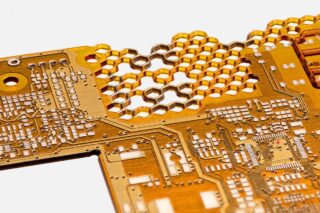With its “Made in China 2025” strategy unveiled in mid-2015, China has set itself the goal of becoming the world’s leading economic power. And the trade war tariffs with the US as well as the recent COVID-19 crisis, far from deterring the Chinese authorities, have strengthened their determination. In this new context, having business intel on corporate China has never been more crucial, especially for businesses and decision-makers involved in the Chinese market.
DirectIndustry magazine has decided to partner with intelligence consultancy DCA Chine Analyse (DCA China Analysis) to offer our readers key information to help you understand and analyze Chinese industry in order to accurately evaluate the competition and your business potential.
In an interview with Camille Rustici, Editor in chief at DirectIndustry magazine, Jean-François Dufour, expert on China and CEO of DCA, gave his insights into China’s industrial strategy with its ambitious “Made in China 2025” plan. He outlined how he sees the future of China in a context doubly complicated by post-COVID-19 and tariff wars, and how his study can help non-Chinese industrialists decipher this very specific market.
DirectIndustry magazine is also giving Jean-François Dufour his own column. Every two weeks, you will be able to read his articles about each objective of “Made in China 2025”, from semiconductors to machine-tools, electric vehicles, railways and telecoms. All of his articles can be found in this new section: China’s Road to 2025.
How would you define the Chinese market today?
Jean-François Dufour: China is first and foremost a continental market in itself. China has 31 provinces that are demographically and economically equivalent to a European country or a US state. Then, the Chinese market operates within the framework of a national strategy. Private companies, if they want to operate in the Chinese market, are obliged to align themselves with this national strategy. This is the hallmark of the Chinese market. Our ambition at DCA is to provide information to decipher this very special market, which is huge and difficult to read.
How can China’s strategic ambition be assessed in light of the current situation?
Jean-François Dufour: Both the conflict with the United States and the COVID-19 crisis, despite appearances, actually reinforce China’s strategy. The trade war is much more technological than commercial. We can see this in particular with the case of Huawei. The American administration’s idea was to convince the Chinese government to abandon its strategic objectives set out in 2015 in the famous Made in China 2025 plan. But this objective has failed. Instead of deviating China from its strategic objectives, the determination of the Chinese authorities has strengthened. One of the main reasons for launching the Made in China 2025 plan was to no longer be vulnerable in relation to foreign technologies. This is clear in the semiconductor sector. Remember the ZTE episode, a telecom equipment manufacturer that almost disappeared under the effect of American sanctions? Today there is the case of Huawei. So this has confirmed to the Chinese authorities that they need to launch this 2025 plan.
COVID-19 has not deterred China from its goal, there is even an acceleration in the deployment of their strategic plan to modernize infrastructure. In March 2020, the Chinese authorities revealed a new strategy called “new infrastructures” focused on 7 sectors. Three of these sectors – the ultra high voltage electrical network, the high-tech railways and the recharging for electric vehicles – have already been identified as priorities in the Made in China plan. The 4 other sectors are new. They refer to 5G, big data, artificial intelligence and industrial IoT. All these instruments will reinforce the modernization of Chinese industry.

What kind of information can be of interest to non-Chinese industrialists?
Jean-François Dufour: Non-Chinese companies first seek information on the potential of the Chinese market. Our studies were created before the COVID crisis, but the content, due to the situation, is becoming increasingly necessary. Things have greatly accelerated and China is no longer at the planning stage. It is deploying heavy things like electric vehicle charging networks and extra-high voltage. And then there is the competitive dimension that interests non-Chinese industrialists. This strategic mobilization makes it possible to see what is emerging in competitive terms and this is an important factor for them.
Is it more difficult to access reliable information in this new context?
Jean-François Dufour: In fact, a lot of data and information is being reported in China. And contrary to what one might think, there is very little hidden, secret information. The trick is to decipher all this information and what strategic plan it is part of. We are looking at information about investment projects, technological partnerships and cooperation between companies. All this is announced, but the problem is the amount of information and the sorting out that has to be done between the impact of announcements of the half-marketing half-propaganda type and the data which announces heavy structural trends and which are of strategic interest. I’ve been working in the Chinese market for 25 years, and I’ve learned to detect credible information. It is the information that has a long-term context that is of interest because it reveals strategic lines of force.
So you think the COVID-19 crisis has reinforced China’s strategy?
Jean-François Dufour: Yes, which makes information even more important today. China’s reaction to COVID-19 increases opportunities because China has the ambition to modernize itself. But at the same time, the risk is greater and in particular the risk of technology theft. It is therefore extremely important to know who you are dealing with and what the strategic projects of the Chinese partners are. Entering the Chinese market without background information is suicidal.
There is a lot of talk in Europe about reshoring production from China. Aren’t industrialists going to increasingly lose interest in the Chinese market?
Jean-François Dufour: I do not think so. All governments advocating for reshoring also want to give their populations purchasing power. But reshoring means price increases. So it’s either relocation or purchasing power, not both. China has managed to take an important place in the global supply chain and I don’t see it losing it. And then there is also the Chinese market itself. Today, reshoring also means giving up the Chinese market. And with everything that is developing in China, it would mean giving up a fundamental market. Moreover, if we look at recent figures, foreign direct investment in China continues to increase despite the rhetoric about reshoring. The COVID crisis has highlighted the problems posed by China as a production center. But we must not forget China as a market.
Yet since 2018 the United States has wanted to withdraw from the Chinese market.
Jean-François Dufour: There may indeed be an open conflict between the United States and China. But I think the American administration will remain attentive to the fact that China has become a fundamental market for Boeing, for example. There has also been an interesting development in recent weeks in the field of electronic components: while the US is in open conflict with Huawei, the US administration has allowed US electronics companies to work with Huawei on the definition of the 5G standard. Working together on such a sensitive subject is therefore a sign that there is no desire to retreat from the Chinese market. There will therefore be a willingness on the American side to limit the conflict at some point. This market is a determining factor for Boeing. It is also the top market for General Electrics. The United States cannot ignore it.










